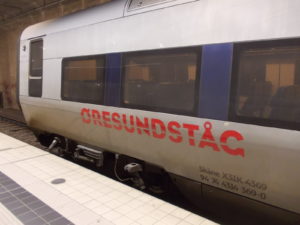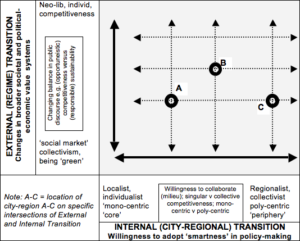Tassilo Herrschel is a Reader (Associate Professor) in Urban and Regional Development and Governance in the Department of Politics and International Relations at the University of Westminster. Tassilo’s work is rooted in the wider field of urban geography, bringing together a spatial perspective and concepts of political economy, with a particular focus on relational and place-centric conceptualisations and analyses of economic processes and political and policy responses.
These are unruly times for Western democracies, with a growing political backlash from people feeling ‘left behind’ and ‘voiceless’ in a seemingly relentlessly competitive neo-liberally designed globalism. Populist nationalist, but also socialism-inspired, political momentum brought us a resurgence in introspective, anti-globalist, xenophobic and nationalistic-authoritarian rhetoric and politics in response. Examples of this shift include the election of Donald Trump as US president, Brexit (Britain leaving the European Union), or, most recently, the grassroots extra-parliamentarian movement of the gilêts jaunes in France. What these outbursts seem to have in common is acting as release valves for pent-up resentments about an actual, but also very much perceived, disconnect between the agendas of a political and economic elite, and a wider part of the population that feels on the losing side of the competitiveness agenda. The resulting divisionary and divisive public rhetoric and politics question democratic principles, especially the notion of collectivity, shared purpose and, importantly, trust in the representative nature of a democratic state system of the whole population in a territory. Ultimately, this corrodes the fabric of, and support for, democratic statehood, where all citizens are to be subject to the same rules, but also enjoy the same rights.
Clearly, the growing intensity of the popular restlessness vis-à-vis the neo-liberal application of globalisation highlights the fundamental concern with the sustainability of existing modi operandi and value systems in politics and governance across spatial scales. The conundrum faced by politics and governance mechanisms and processes is how to square the circle between pressure for increased competitiveness under globalisation, favouring individualistic behaviour and rationalities, and the equally strong – and growing – pressure to address widening inequalities between and within state territories. This applies in particular to metropolitan areas as the foci of national and regional economic prowess, but also of growing inequality both within them, and between them and the ‘rest’ of a region or state outside. Cities, especially city-regions, are thus instrumental to addressing the seemingly inherent contradiction between the perceptions of individual opportunities and the role of collective and collaborative engagement within that. This starts already when policy co-ordination between neighbouring municipalities, for instance, promises win-win gains for the participants. Yet, such gains are not recognised as an individual advantage resulting from such collective action. Rather, local/regional policy-makers may favour individual ‘going it alone’ action as likely best route to greater individual returns. The political system of representative democracy based on territory-based voting, tends to support such narrow logic.
Figure 1: Øresund Train

The complex challenge with conflicting interests and expectations asks, in effect, for a squaring of circles for policies. The term ‘smart’ is used here to capture the needed imagination and creativity in likely political and policy solutions to this conundrum. Originating in the North American idea of smart growth as an effort to reconcile conflicting interests and expectations concerning urban development, ‘smart’ may describe innovative and politically entrepreneurial policies that seek to tackle a competing simultaneity of different geographic, societal and political-economic dynamics. The conceptual fuzziness of ‘smart’ may be useful here. Much of the complexity has to do with the two – competing – roles of metropolitan areas, or city regions: (1) being the foci and also drivers of the selective opportunism inherent to city-defined and city-centric global visibility and competitiveness sought by regions and states; and (2) being also an integral part of the territorial and institutional structure of a state (or region), with required adherence to collective responsibilities and requirements. It is here that the conundrum between urban self-interest, seeking to ‘go it alone’ to maximise envisaged own capacity and opportunities, and being tied into the societal, economic and political-institutional fabric of a territorial state becomes challenging. And this, ultimately, goes to the question of democratic representation and legitimacy of policy decisions.
It is here, now, that the role of the (democratic) state comes in as agent of its territorial manifestation. Such involves securing its functional and ideational integrity, while simultaneously permitting responsiveness to changing internal and external circumstances in the interest of competitive, urban-centric economic foundations that are also to serve the interests of all. The highly political nature of this balancing act between territorialised institutional power, and (city-centric) network-based economic opportunity spaces, is clearly illustrated in the rationale for rebranding the international, Danish-Swedish Øresund Region as Greater Copenhagen and Skåne in 2016, and just Greater Copenhagen in 2019. Expected improved competitive global standing led to a (somewhat reluctant) subsuming of the southern Swedish regions of Skåne and, from next year, its northern neighbour Halland, under the Greater Copenhagen umbrella. In other words, parts of the Swedish territorial state become ‘metropolitanised’ or ‘Copenhagenised’. It is a complex relationship with shifting rationales and also changing contexts. For instance, the territorial state reasserts itself through the re-introduction of border controls for traffic crossing the Øresund Bridge from Denmark, opened in 2000 as connector between both countries. And actual connectivity, visible in the branded Øresund Train (Figure 1) has helped foster a sense of actual and imagined (albeit selective) reachability and togetherness. Yet, national regulations and political agendas continue to have a decisive impact, also in the form of obstacles, such as border controls or a sluggish regulative alignment between the two states, which ‘far away’ Stockholm views as less pressing.
Given the inherent dynamic on external and internal interests, aspirations and considerations, there is not a single ‘smart’ answer to reconciling conflicting interests through adroit governance. Depending on place, state context and policy-making milieu, there are diverse, and changing, variations of ‘transitions’ in societal values and state cohesiveness on the one hand, and localist (urban) interests, on the other. There are thus two dynamics pushing for changes (see Figure 2): Internal ‘transition’ towards a new compromise between individualistic neo-liberalism and cohesive collectivity within a city-region (metropolitan area), perhaps to something termed by Scott (2001) as the “beyond” post-Fordist city-region, and changes externally in national politics and institutional workings under the umbrella of ‘democracy’.
Figure 2: Dual Transition towards Adopting Smartness in City-Regional Governance in Different Places

Note: A-C depict localities/territories
Source: Herrschel and Dierwechter, 2018
So, ‘smartness’ in policy making will need to not just permit, but facilitate the fact that economic, physical or political space is now part and parcel of newly forming collaborative city-centric network spaces of (envisaged) enhanced opportunity. Such virtual spatial backcloths are ‘woven together’ by collaborative networks (Shahrokni and Brandt, 2013) of communication – be they physically analogue or digital. These spaces result from intelligent decision-making and engagement of multiple actors, including democratic participation and engagement. They may well be competing with the territorially defined, bounded state in terms of engagement and participation and sense of ‘ownership’. Effectively, therefore, a form of deconstruction occurs, in which conventional state territoriality as the common reference for identity, community and sense of belonging is being challenged, and potentially fragmented, by a virtual (‘soft’) spatial representation of, and engagement with, selective, largely metropolitan-defined and –centred, economic rationality.
At the same time, such spaces of opportunistic engagement (networks) depend on formal institutions and associated fixed territory for implementation and legitimation of policies. There are thus two processes that interdepend and shape, while also being shaped by, the particular ‘composite circumstances’ found in a city or city region. And these twofold dynamics lead to place-specific ‘dual transitions’ in governance principles and practices to best address the conundrum between competitive individualism and cohesive collectivism: ‘internal’ as place-specific changes to shaping and implementing innovative (‘smart’) governance, and ‘external’ as product of different socio-economic and cultural contexts in their underlying changes (‘external transition’).
And here, the perception of a non-metropolitan (peripheral) and excluded “other” contrasts with notions of an increasingly dominant (and perceived aloof) metropolitan and city-regional striving for greater visibility and political-economic dominance, pushing a city-centric narrative that may crowd out other perspectives, interests and experiences. It is from here that a perception of unequal ‘voice’ in democratic processes and decision-making and subsequent governance priorities and modi operandi originate. Such unevenness fundamentally undermines and questions the notion of uniform equality and democratic egality across a state territory. Instead, spaces of differing opportunity – economically and politically-democratically – vary between and also within city-regions. And so, there is increasingly pressure to look “beyond neoliberalism”. In many post-authoritarian societies, for instance, as in post-socialist Eastern Europe, a rising new nationalism rejects globalism and interconnectedness, favouring, instead, a strong state ‘looking after’ (all) its people. These multiple (and concurrent) variations put cities at the forefront of developing smart responses to reconciling (state cohesiveness) and individual urban competitiveness, such as through an open public debate, as best opportunity in a globalised economy, rather than challenging ‘inclusive’ state territoriality head on.
Further Reading
Herrschel, T., & Dierwechter, Y. (2018). Smart Transitions in City Regionalism: Territory, Politics and the Quest for Competitiveness and Sustainability. Routledge.
Herrschel, T. (2014). Cities, state and globalisation: City-regional governance in Europe and North America. Routledge.
Are you currently involved with regional research, policy, and development, and want to elaborate your ideas in a different medium? The Regional Studies Association is now accepting articles for their online blog. For more information, contact the Blog Editor at RSABlog@regionalstudies.org.